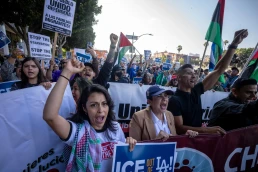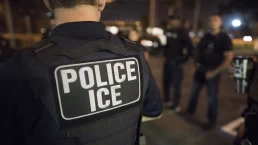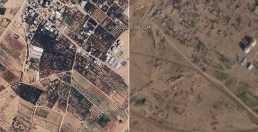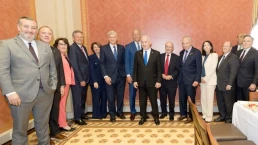The Stop Cop City movement recalls Atlanta’s 1996 Olympic bid and the city’s long history of prioritizing tourists, business interests, and wealthy white communities over Black and working-class people.
by Micah Herskind, Prism
On Jan. 18, 2023, a squad of local and state police officers marched into the Weelaunee Forest in southeast Atlanta, where they shot and killed a young, queer, Indigenous-Venezuelan protester named Manuel “Tortuguita” Terán. Tortuguita was one of many Atlanta forest defenders, a decentralized group of activists that has been living in the forest since 2021 to protect against its proposed destruction and replacement with “Cop City”—a massive police militarization facility complete with a “mock city” inside for police to practice their many tactics of urban warfare and repression.
The city is leasing 85 acres of the Weelaunee Forest (land originally stolen from Muscogee Creek people) to the Atlanta Police Foundation for Cop City, but it is located in a majority-Black area of DeKalb County outside of city limits, resulting in significant disenfranchisement of its residents who have few easily accessible official channels to register their dissent. While Cop City would impact everyone in Atlanta and across the country, it will have especially disastrous ramifications for nearby residents, who will lose the benefit of the forest’s flood prevention and cooling impacts. Indeed, this is land that the city referred to in 2017 as one of the “four lungs” of Atlanta and slated for incorporation into a broader set of park land—a promise the city broke just four years later.

While the political assassination of Tortuguita thrust the multi-year struggle against Cop City into the national spotlight, Atlanta organizers have been working against the project for years. The proposal first went public in early 2021. It was quickly opposed by a broad coalition that included environmental justice and human rights organizations, abolitionists, groups working against gentrification, clergy, neighborhood associations near the proposed site, and more. Community members consistently advocated and attended public meetings throughout the summer of 2021. When it came time for the final City Council vote on the Cop City legislation, the council meeting lasted two days due to over 17 hours of public comment, in which the vast majority of commenters opposed the project.
Recent Posts
What To Do When You See ICE In Your Neighborhood
July 14, 2025
Take Action Now How can you deter the Trump administration’s immigrant deportation machine when it pops up in your community? Follow these…
ICE Campaign Of Violence Will Lead To More Deaths
July 14, 2025
Take Action Now Jaime Alanis’s death shows the horrific consequences of a secret police force behaving with utter impunity.By Natasha Lennard, The…
Hague Group: “Concrete Measures” or Sack of Cement? Will It Move to Sanctions, Peace Force and Ensuring Aid to Gaza?
July 13, 2025
Take Action Now Will the meeting in Colombia be a coalescence of global opinion driving states to just action — or just more rhetoric from various…
Why Are Democratic Lawmakers Still Meeting With Netanyahu?
July 12, 2025
Take Action Now Pictures show Democrats like Chuck Schumer standing next to Netanyahu, smiling.By Sharon Zhang, Truthout A bipartisan group of…




